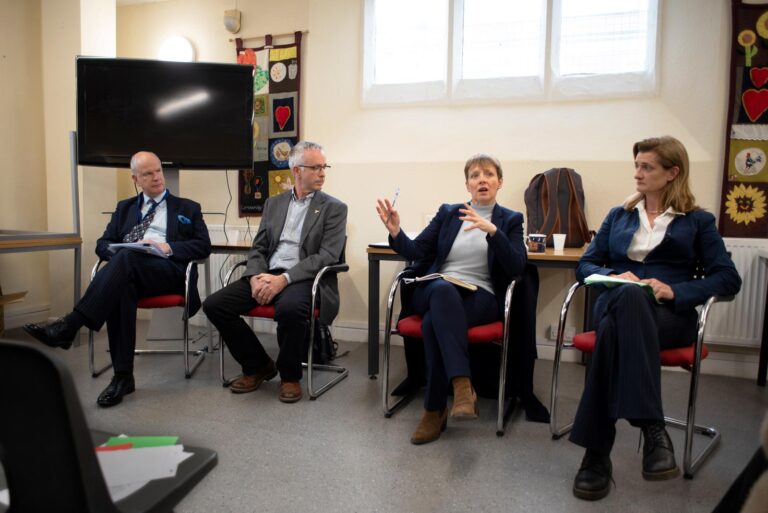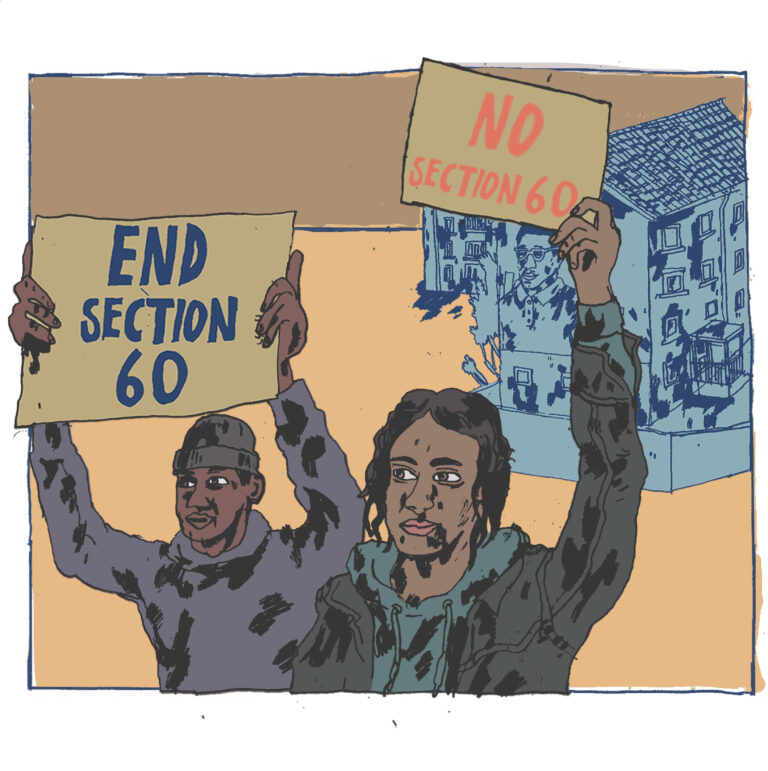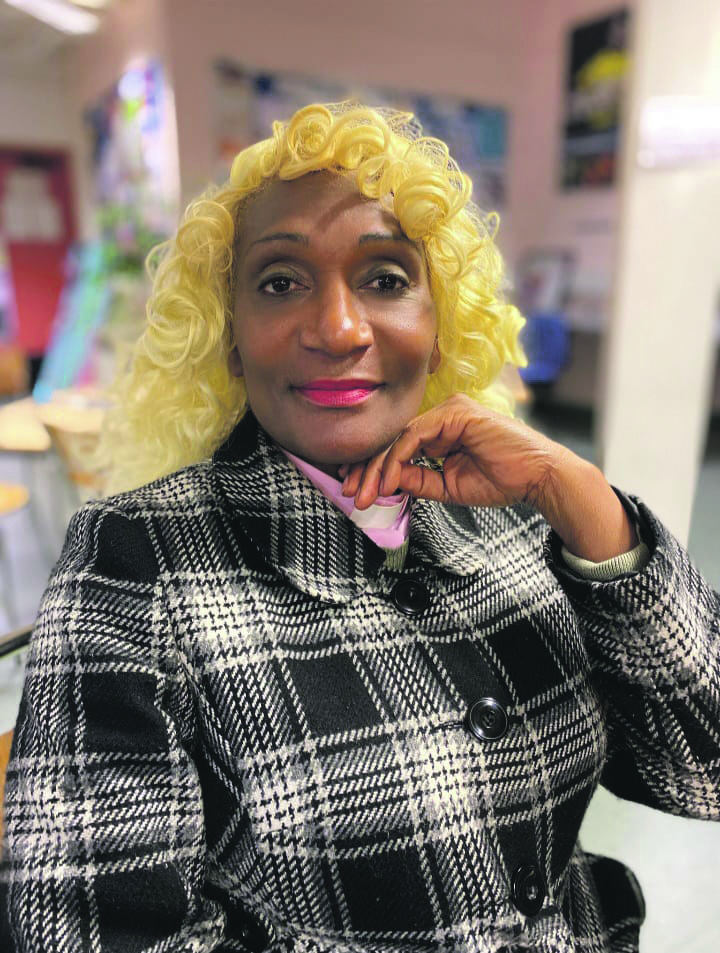Police and crime commissioner candidates on knife crime, institutional racism and public health policing

Mark Shelford, Benet Allen, Clare Moody and Katy Grant at a hustings event organised by Bristol Women’s Voice (Photo: Tina Gue for Bristol Women’s Voice)
Following a spate of fatal stabbings in Bristol, there’s no question that tackling knife violence should be and is at the forefront of candidates’ campaigns to become the region’s police and crime commissioner (PCC).
The role is broad. But at its heart is convening organisations across Avon and Somerset to develop a strategy for reducing violent crime, setting the budget, and ensuring things are moving in the right direction.
“It’s the soft power of the PCC, the ability to bring people together and work on this basis, that’s important,” Clare Moody, Labour’s candidate, tells the Cable. But what does that mean in practice, and how would she do things differently to her rivals?
Ahead of the vote on 2 May, we spoke to Moody and the three other candidates, taking them to task on their key priorities and strategic vision for policing. Knife crime, violence against women, racism, and public health were the topics up for discussion.
Public health policing
The police and crime commissioner’s office plays an important role in promoting a public health approach to crime. Simply, this means understanding and addressing the social problems that fuel crime, rather than just focusing on punishment.
The commissioner convenes the Violence and Reduction Partnership (VRP), funded by the Home Office. This gathers local organisations to explore violent crime’s root causes, and provide initiatives focusing on education and prevention.
The current police and crime commissioner, Mark Shelford, is a Tory whose 32 years of military experience shaped his stance on good and bad policing. He says he recognises the need for a public health approach to crime – but that the police’s role is limited.
“Let’s look at the definition of public health,” he tells the Cable over Zoom from a countryside pub. “Police deal with the symptoms and the rest of us – the community, the council – look at the causes. That’s the public health approach.”
That’s only partially true though. Police can help shift the focus from dealing with the symptoms of crime to the root cause, according to the College of Policing, which sets strategic and tactical standards in law enforcement.
“You can’t just say, ‘We’ll deal with the symptoms,’” says Moody, Labour’s candidate on the ballot paper. She’s the CEO of Equally Ours, an equality charity, a former MEP and trade unionist. During the financial crisis in the 2000s, she worked in Number 10’s policy unit.
“You’ve got to look at a systemic approach, and the [police and crime commissioner] has a convening role around that,” Moody tells the Cable, over coffee in a cafe opposite City Hall, where she’s attending a conference.
Green candidate Katy Grant, councillor for Clifton and family court magistrate, who previously worked for the UN on child protection and violence against women in conflict in the global south, isn’t so sure about seeing knife violence as a public health issue.
“The Greens are keen on treating drug use and misuse as a public health issue. I guess I’ve never quite framed knife crime that way in my head,” she says over Zoom.
“But I do see taking that kind of an approach would be helpful, if you mean looking at the whole thing from a super holistic point of view, starting with young kids, prevention, activities in schools, outreach to families,” she adds.
The Lib Dem candidate Benet Allen, a Somerset councillor and choir singer, agrees that early intervention is key. “We need to pick up potential offenders earlier – ideally before they become actual offenders,” he says over the phone – from a lay-by on his return from a police ride-along.
“Incarceration is rarely the answer,” he says. Asked what would help steer justice towards a more restorative, preventative approach, he says: “Policemen would be visiting schools, demonstrating to school children how society works.”
Shelford says the stage that violence reduction units identify whether children are at risk of violent crime – either as perpetrators or victims – is currently “too late,” usually when somebody’s been expelled or excluded from school.
If he’s re-elected, Shelford says his office would look at “getting a psychologist in” to interview children identified by the VRP to understand what it is that’s making them carry knives.
“Could it be social media, YouTube, sexy adverts for knives, or a type of music they’re listening to?” he muses, suggesting that as well as the social issues that underpin youth violence, a child’s cultural preferences could lead them into a life of crime.
This is, it should go without saying, pretty controversial. Linking drill and rap music with knife and youth violence has long been challenged, as has the fact that song lyrics and music taste is often used as evidence in court against mainly young Black men.
Institutional racism
Chief constable Sarah Crew admitted last June that Avon and Somerset Police is institutionally racist. She also acknowledged a likely culture of misogyny, homophobia and discrimination against people with disabilities in the service.
Her statement followed a review into the Metropolitan Police by Baroness Casey that revealed the extent of the London force’s institutionalised failures. Crew said she recognised the “structural and institutional barriers that exist” and put people of colour at a disadvantage when they interact with police.
The Cable asked all four police and crime commissioner candidates if they supported Crew’s statement and her intentions to address the police service’s institutional failures. Labour’s candidate, Moody, and Grant for the Green Party both say yes, but that there’s a long way to go to root out the systemic issues in the police.
Asked how she would address it, Grant says there’s the “huge story” of new recruits to the force. “There’s several thousand police officers in training now, so obviously a lot of experienced police have been lost, but this is an amazing opportunity, with the right curriculum and pretty constant performance monitoring [for the force] to evolve.”
Shelford, who appointed the current chief constable, says: “I completely support her. When I hired her at the beginning of my tour, we sat down and talked about cultural change in the police, including things like misogyny and racism… We needed leadership, because it starts there.”
Lib Dem candidate Allen is less forthright. “I’m not going to disagree,” he says. “She made that announcement on the basis of an internal report, which I haven’t seen.”
Allen also admits to not having read Baroness Casey’s report on the Met. “I certainly will involve myself with that particular issue,” he says, asked if he would brush up on his knowledge if he were to be elected.
He adds he would “certainly be listening” to the Police Federation, whose regional chairman condemned Crew’s statement for driving “a divide between our officers and communities” and doing “nothing to drive change or amend [police] culture”.
Stop and search powers
All of the candidates acknowledged that regional and national trust in policing was historically low – particularly among Black and ethnic minority communities. We asked if controversial police powers like stop and search, when officers regularly target people of colour disproportionately, are partly to blame.
Following a series of fatal stabbings in Bristol this year, Avon and Somerset Police launched an operation to tackle knife crime. Speaking at Shelford’s performance and accountability board in February, the chief constable said “unreasonable” use of stop and search was not the solution.
When police enacted heightened stop and search powers in Easton following the fatal stabbing of 16-year-old Darrian Williams on 14 February, officers found no knives. They disproportionately targeted people of colour – according to the police service’s own data.
Clare Moody defended officers’ use of the controversial power following Darrian’s murder. She said she had it on “good authority” that the police had the community’s consent.
What does this mean in practice? “You need to make sure you are giving supportive policing, that you’re not policing at a community [but] with a community, that you’re of the community,” is her response.
But how is Avon and Somerset Police doing on that front?
“There’s a lot of room for improvement,” admits Moody. A major recruitment campaign by the force racially discriminated against black and ethnic minority applicants, with Black candidates twice as likely to be rejected than white peers. Fewer than one in five Black candidates over the last three years became police officers.
Katy Grant says there is “a place” for stop and search, but that there’s “a lot to be said about how it’s done… If it doesn’t work then the police should be thinking about other ways to do it.” Allen for the Lib Dems says he wouldn’t comment on operational matters, but would “be listening to my chief constable to find out what works and what doesn’t”.
On the example we made, Shelford says that the fact police made “a lot of noise” about their use of heightened stop and search powers, known as Section 60, and that no one was carrying a knife, “shows it was a success”.
When put to him that this isn’t necessarily true, it might be that officers were simply unsuccessful and, crucially, used the power disproportionately, he added: “In this case it was very important [to use stop and search].”
Shelford also claims the power, in this case at least, was authorised after consultation with the local community. “Consent is crucial,” he says.
Violence against women
Another aspect of policing that’s a priority for Grant, and is a key pledge by all four police and crime commissioner candidates, is tackling violence against women and girls. We put to her and her rivals a specific example of how the police in the region had failed on the issue.
In October 2023, it was revealed that more than 300 domestic violence disclosure applications to Avon and Somerset Police were stuck in a backlog. The applications let people find out from police about a potential abuser’s past behaviour, so they can warn someone at risk of abuse. The police, under what’s known as Clare’s Law, can also disclose information to someone without an application if they believe they are at risk.
All the backlogged requests, police admitted, were being dealt with by one person – although more were being brought in to help. This happened on Shelford’s watch, despite his commitment to training for all officers for handling domestic abuse. Asked if he thought having one officer dealing with these requests was acceptable, even given pressures on police budgets, he says: “It’s not, but it became apparent and we changed it.”
Moody says how the police handle violence against women and girls “requires specialist knowledge, specialist attention.” She adds: “You’ve got to have those people in the communication centre when people call for help.”
Grant, speaking to the issue of recruiting and training specialist officers for domestic abuse, says: “There’s an important debate in the police about whether what you need is specialist teams, or if you just need better training for all officers.”
Explaining why the commissioner and the chief constable might need to choose between the two, she says: “The general backdrop is appalling: financial crisis, under-resourcing… And there’s always going to be a question of budgetary priority. You can’t get money out of thin air.”
Asked what training is available to officers and what would help them better handle call-outs and liaison with victims and potential victims of domestic abuse, Allen says: “There’s an awful lot of [training] available and it seems to me quite comprehensive. We never stop learning [though].”
A lack of gender diversity in the police – women occupy 31% of the workforce – might also help when it comes to tackling issues that disproportionately affect women.
This is something that was raised at a hustings event hosted by Bristol Women’s Voice on 17 April, where the moderator asked the candidates how they planned to make the service more diverse.
All responded by making promises to develop childcare initiatives, but notably and again very controversially, Shelford said: “Physical fitness tests are an issue. Should middle aged women be taken off and given more sedentary roles?”
Abolishing the role
Speaking of budgets, the police and crime commissioner role itself has its opponents not least for its cost to the taxpayer. Allen’s party, the Lib Dems, are calling for its scrapping, with the estimated £150 million of savings every four years being invested in frontline policing.
Shelford has 31 members of staff. “Vote for me [and] it will be a smaller office,” Allen says, adding that without a police and crime commissioner there would still be police and crime panels, where there is “democratic oversight” of regional policing.
Grant also questions the value for money the police and crime commissioner brings, “particularly in these stricken times when there’s not enough money [for police] to respond correctly, in real time, to domestic violence calls.”
Rather than a politically elected individual who holds the police to account, she floats the idea of the force’s performance being measured by the local authority.
Moody sees it differently: “It matters that it’s there [the role]. You wouldn’t touch the sides in terms of the cuts that there have been to policing if you abolish the PCC.”
Speaking of cuts, Shelford has come under fire from both his fellow candidates and the public for his plans to cut PCSOs in the region.
In February, the Avon and Somerset police and crime panel voted to approve a higher than expected rise in the police’s proportion of council tax bills – an additional £13 a year for the average household.
“To balance the books, to do good housekeeping,” Shelford says, “I’ve made a decision with the chief constable to stop recruiting in some areas of police staff because that’s the only area we can save money.”
But is the answer to crime reduction putting more police officers on the street anyway? Why spend more on police when we could invest in communities to address the social issues linked to crime, like youth services and good quality housing?
The candidates’ answers to this, apart from Shelford’s, were unsurprisingly directed at how the current national government has hollowed out public services. All, however, believed that police having a more visible presence in the community would be a good thing – if that presence is a positive one.
“That’s one of the roles of the commissioner… making sure that there’s a fair, consistent and visible policing that responds to the needs of the community,” says Moody. How this would translate into a strategy if she becomes commissioner remains to be seen. Whoever wins, they’ll have until April next year to put together a police and crime plan.









